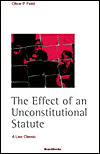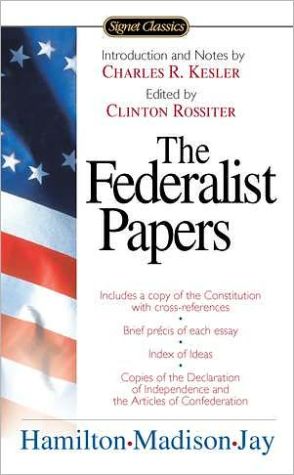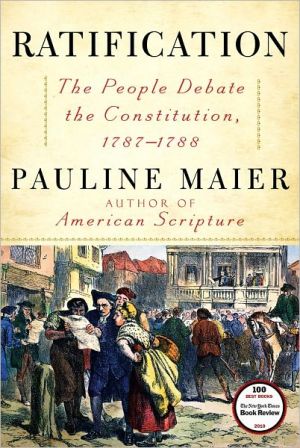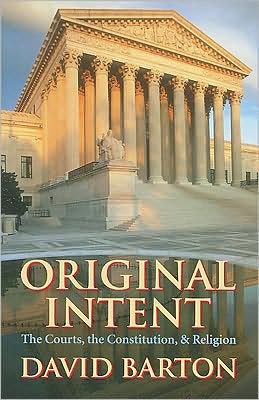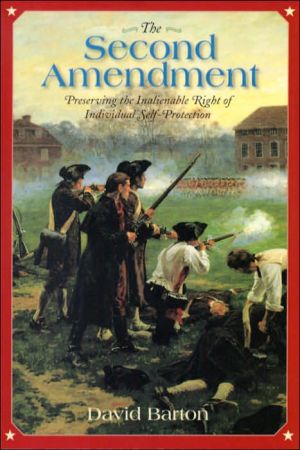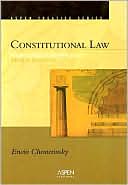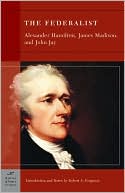The Effect of an Unconstitutional Statute
Search in google:
I.Introduction1Theories of the Effect of Unconstitutional Statutes2The Void ab Initio Theory3The Presumption of Validity Theory4The Case-to-Case Theory6The Historical and Doctrinal Basis of Theories8Scope and Limits of This Study12II.The Status of a Private Corporation Organized Under an Unconstitutional Statute15Cases in Which There Have Been Dealings on a Corporate Basis16Cases of Dealings between a Corporation and a Stranger16Where the Corporation is the Plaintiff16Where the Corporation is the Defendant19Disputes between a Corporation and Its Officers or Members28Cases in Which There Have Been No Dealings on a Corporate Basis32Conclusions37III.The Status of a Municipal Corporation Organized Under an Unconstitutional Statute45Attack on Corporate Status by an Official Representative of the State45Disputes between Two Municipal Corporations49Disputes between Officers or Claimants to an Office51Attack53Quo Warranto on Relation of Private Individuals55Tax Cases56Eminent Domain62Resisting Abatement of a Nuisance62Criminal Cases63Suits to Enforce Contractual Obligations against a Municipality65Tort Cases72Incidental Attack in Suits between Private Parties73Conclusion73IV.The Effect of an Unconstitutional Statute in the Law of Public Officers: the Effect on Official Status77Attack by Persons Acting in an Official Capacity77Quo Warranto by the Attorney-General or Some Official Representative of the State77Contests between Rival Claimants to an Office79Information in the Nature of Quo Warranto80Mandamus81Injunction83Attack by Persons Acting in an Individual Capacity84Quo Warranto84Tax Cases85Injunction85Action to Collect Taxes86Eminent Domain88Bonds and Other Contract Obligations90Torts93Civil Cases in Which Office or Title of Judicial or Clerical Officer is Challenged94Judicial Officer94Clerical Officer100Criminal Cases Challenging the Existence of a Court or the Title to Office of a Judge or Clerical Officer101Attack on Title of Judge101Attack on Title of Officers Attached to Court105Cases of Crimes Involving Official Status107Compensation108Summary and Conclusions113V.Liability of Public Officers for Action or Nonaction119Introduction119Injunction119Mandamus119Criminal Prosecution against an Officer121Action for Damages against an Officer122Refusal to Act123Direct Act without the Intervention of Judicial Process129Collection of Tax under an Unconstitutional Statute129Destruction or Invasion of Property130Interference with Personal Liberty in the Absence of a Warrant133Action Connected with Judicial Proceedings135Liability for Making Complaint or Filing Affidavit135Liability of Magistrate for Issuing Warrant, Trying, or Sentencing a Person under an Invalid Statute138Liability of Officer Serving Process141Liability of the City or Governmental Unit for Which the Officer Acts144Protection of Officers Acting or Refusing to Act under an Unconstitutional Statute145VI.Res Adjudicata, Stare Decisis, and Overruled Decisions in Constitutional Law150Exceptions to Res Adjudicata152Stare Decisis and Res Adjudicata158Stare Decisis162Between Coordinate Courts of One Judicial System162Between Courts of Different Jurisdictions162Between Superior and Inferior Courts of the Same Judicial System163Between the National and State Courts163As Applied to Decisions by the Same Court164VII.Reliance Upon Decisions and the Effect of Overruling Decisions in Constitutional Law181Criminal Cases182Civil Cases187Contract Cases187Property and Miscellaneous Cases191Personal Liability of Persons Acting in Reliance on Court Decisions or Orders195VIII.Government Bonds and Private Promises Under Unconstitutional Statutes198Promises Made by One Individual to Another198Government Bonds and Promises204Private Promises to Pay or Repay the Government215IX.Mistake of Law and Unconstitutional Statutes: Payments and Services221Payments and Services by One Individual to Another222Payments222Services228Donations to, and Performance of Services for, the Government232Donations to the Government232Services Performed for the Government233Recovery by Government of Payments to Officers and Private Individuals237Recovery of Payments Made by One Governmental Unit to Another239X.The Recovery of Unconstitutional Taxes241Preventive Measures241Tax Refunds245Tax Recovery251The Plaintiff Should Have Resisted Payment of the Tax252Ignorance of the Law Not a Ground for Relief252Only an Exercise of Legislative Power Can Authorize Repayment of Money Paid into Treasury253Taxpayer Has Received the Benefits from the Government's Expenditure of Tax Money253Taxpayer Only Nominally the Real Payer and Refuses to Refund Money to Those from Whom He Collected It254To Permit Recovery Would Disrupt Finance255Protest and Duress261Protest261Compulsion264Conclusion269A Note on the Recovery of Fines272XI.Amendatory, Validating, Curative, and Remedial Measures274Amendments to Invalid Statutes274Effect of an Invalid Amendatory or Repealing Statute283Effect of Congressional Action Removing Obstacle to State Exercise of Power286Effect on Invalid Statute of Subsequent Constitutional Amendment288Curative, Validating, and Compensatory Acts294XII.Judicial Review as an Instrument of Government305Introduction305Judicial Review in a Federal System305Judicial Review and the Separation of Powers306Judicial Review to Protect Private Rights306Defects in the Operation of Judicial Review306Private Litigants306Public Nature of Controversy Not Clear308Private Individuals Control Presentation of Questions309Rules on Parties Narrowly Interpreted311Conflict of Governmental and Private Interests311Judicial Review and Legislation312Delay313Furnishes Insufficient Standards for Legislation313Judicial Review as a Supervisory Agent318Judicial Review and Private Rights324Conclusion324Table of Cases327General Index351
